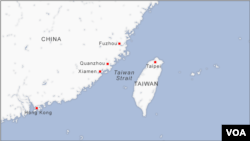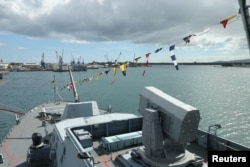Two German naval vessels are en route from South Korea to the Philippines through the South China Sea in what analysts describe as a show of Berlin’s resolve to confront Chinese threats that now extend as far as Europe.
Two ships left the South Korean port city of Incheon on Tuesday bound for Manila, said the South Korean navy. They are expected to pass through the Taiwan Strait, according to Reuters, but it is uncertain when that transit will take place.
The navigation across the South China Sea would be the first such passage by German warships since the destroyer Bayern was deployed to the region from August 2021 to February 2022 in an exercise in defense of the freedom of navigation.
That time, the Bayern sailed from South Korea to Singapore but did not pass through the highly sensitive Taiwan Strait.
Rare passage
If a transit is made through the strait this time, it will be the first time that German warships have done so in 22 years.
China claims sovereignty over the self-ruled island of Taiwan and, while most countries regard the 177-kilometer-wide strait that separates it from the mainland to be international waters, Beijing opposes transits by military craft from other countries. The U.S. and other countries such as Canada have sent warships through the strait to exercise their rights under international law.
The navigation across the region is part of the Indo-Pacific Deployment (IPD) 2024, a set of multinational naval exercises and international operations that began in May and will last until December.
The German Navy called IPD “the most important” security operation this year in light of Russia’s war in Ukraine, which has forced Berlin to reprioritize its defense strategies.
U.S. Deputy Secretary of State Kurt Campbell, speaking in Belgium on Tuesday, expressed “strong concerns” about “increasing military support” that China, North Korea and Iran provide to support “Russia’s war of aggression” against Ukraine.
Daniel Kochis, a senior fellow at Hudson Institute’s Center on Europe and Eurasia, said the significance of the transit “should not be understated” because it would demonstrate “German resolve in defense of freedom of navigation and Chinese threats against Taiwan.”
“China’s role in supporting the Russian war effort has helped crystallize an understanding in Europe that you cannot divorce transatlantic security from that of the Indo-Pacific,” Kochis said.
Increasing role
Berlin has stepped up its security role in the Indo-Pacific since a NATO summit held in July in Washington, where NATO countries and their Indo-Pacific partners of Australia, Japan, New Zealand and South Korea agreed to boost cooperation.
Shortly after the summit, Germany joined the Japanese Air Self-Defense Force in conducting joint aerial drills around Chitose Air Base on the Japanese main island of Hokkaido.
From June to August, the German air forces participated in Pacific Skies 24 aerial drills alongside other European countries and Australia, India, Japan and the U.S. During the same period, the German navy took part in biannual multinational drills dubbed RIMPAC at the invitation of the U.S. Navy.
In August, it joined the U.S.-led U.N. Command in South Korea, becoming the 18th country to support the international body charged with defending against North Korean aggression if a war breaks out.
After the German frigate Baden-Wurttemberg and the replenish ship Frankfurt am Main arrived in South Korea last week, the frigate held naval drills with South Korean forces and participated in a maritime operation to monitor U.N. sanctions against North Korea, said the South Korean navy.
“Germany’s reported decision to have two naval vessels pass through the Taiwan Strait would be a more assertive action than the 2021 deployment, in that it counters China’s claim of special jurisdiction over the 110-mile-wide waterway under its ‘one China’ policy,” said Stephen Flanagan, who served as senior director for defense policy and strategy at the National Security Council from 2013 to 2015.
“Germany, and most other countries, hold that ‘innocent passages’ of naval vessels through the Taiwan Strait are allowed, without notice, under the principles of international maritime law, including the U.N. Convention on Law of Seas, so long as they are ‘not prejudicial to the peace, good order or security of other states,’ ” he continued.
However, Germany’s and other European countries’ deployment to the Indo-Pacific “would place further strain on their armed forces” as they are “struggling to meet their NATO commitment for defense of the Euro-Atlantic region,” said Flanagan, an adjunct senior fellow at RAND Corporation.
Beijing’s protest
Chinese Foreign Ministry spokesperson Mao Ning said at a press briefing in Beijing on Tuesday that “we firmly oppose any act of provocation under the pretext of freedom of navigation by relevant countries that harm China’s sovereignty and security.”
She continued, “The waters of the Taiwan Strait, from both shores toward the middle of the strait, are China’s internal waters, then territorial sea, then contiguous zone, and then exclusive economic zone.”
Ning added, “Taiwan is an inalienable part of China’s territory.”
The Taiwanese Foreign Ministry pushed back against Beijing’s remarks.
A Foreign Ministry spokesperson told VOA on Tuesday that “the Taiwan Strait is internationally recognized as international waters, where ships from any country can freely navigate and pass through as evidenced by numerous past cases.”
The spokesperson continued, “Taiwan’s consistent stance is that it respects and welcomes the exercise of the freedom of navigation rights of all countries in international waters.”
Philip Shetler-Jones, senior research fellow of Indo-Pacific security at the Royal United Services Institute, said, “There is no basis in the international law for Beijing’s protest against the free passage of ships through the Taiwan Strait.”
He continued, “Claims that the strait is an internal waterway are part of the [Chinese] Communist Party’s information campaign to convince the outside the world that Taiwan is part of the People’s Republic of China, which is not the case,” he said.




